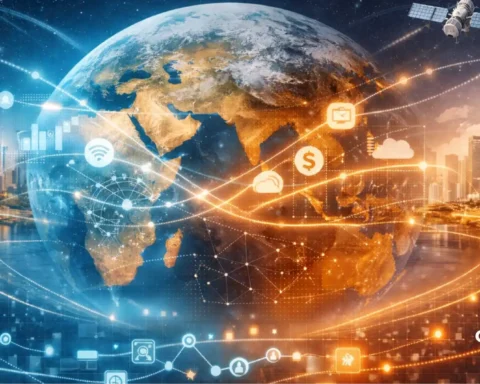In the 21st century, social media has become a cornerstone of communication, profoundly influencing democracy and governance. The globalization of social networks has facilitated cultural exchange, economic growth, and the formation of global communities. However, it has also raised significant concerns regarding privacy, ethics, digital inequality, and the transformation of news consumption. This blog explores the multifaceted impact of social media globalization on democracy and governance.
Table of Contents
Social Media Globalization: A Catalyst for Cultural Exchange and Understanding
Social media platforms like Facebook, Twitter, and Instagram have broken down geographical barriers, allowing individuals from different cultures to interact and share their experiences. This cultural exchange fosters mutual understanding and appreciation, contributing to a more interconnected world. For instance, hashtags and viral trends can quickly spread cultural phenomena across social media users, making it easier for people to learn about different traditions, languages, and lifestyles from across the globe. This connectivity positively enhances global harmony and reduces prejudices, ultimately supporting democratic values by promoting tolerance and inclusivity.
Moreover, social networking sites provide a platform for marginalized voices, enabling them to share their stories and experiences with a global audience. This democratization of content creation and dissemination can lead to greater empathy and solidarity among different cultural groups. By exposing individuals to diverse perspectives, social media helps to break down stereotypes and promote a more inclusive and accepting global society. Social networks also serve as an effective tool that allows organizations and internet users to advocate for human rights effectively.

Social Media Globalization: Driving Economic Growth and Entrepreneurship
Social media globalization has also spurred economic activities and entrepreneurship. Social media activities provide businesses with a global marketplace to reach potential customers, regardless of their physical location. Small businesses and startups can leverage social media usage to market their products and services, engage with customers, and build brand loyalty. Moreover, social media advertising has become a lucrative industry, generating significant revenue and creating jobs. Entrepreneurs can utilize these platforms to launch innovative ventures, democratizing access to economic opportunities and fostering a more dynamic and inclusive economy.
For instance, social media networks like Instagram and Pinterest have become crucial tools for small business owners and artisans to showcase their products to a worldwide audience. The ability to target specific demographics with precision marketing strategies allows businesses to optimize their outreach and grow their customer base efficiently. Furthermore, the data analytics provided by these platforms enable companies to understand consumer behaviour and preferences better, leading to more informed business decisions and improved products and services. All in all, this leads to inculcating a participatory economy that fosters economic growth due to the opportunities created by social media platforms.
Social Media Globalization: Fostering Global Communities and Networks
Beyond economic benefits, social media globalization has enabled the formation of global communities and networks. These virtual communities bring together individuals with shared interests, values, or goals, regardless of their geographical location. For instance, activists can mobilize support for social and political causes, amplifying their voices on a global scale using effective communication. This interconnectedness allows for the rapid dissemination of information, coordination of collective actions, and building solidarity across borders. Such global networks can strengthen democratic governance by promoting civic engagement and holding authorities accountable.
One notable example is the #MeToo movement, which gained international traction through social media sites. This movement has highlighted issues of sexual harassment and assault, leading to significant societal and legal changes in various countries. Social media outlets have empowered individuals to share their experiences and support one another, creating a global network of advocacy and change. Similarly, environmental movements like Fridays for Future have used social media to organize worldwide protests and raise awareness about climate change, demonstrating the power of these platforms to drive collective action, societal change and positive impact.

Social Media Globalization: Privacy Concerns and Ethical Implications
However, the globalization of social media is not without its drawbacks. Privacy concerns and ethical implications have emerged as significant challenges. The vast amounts of personal data collected by social media companies raise questions about data security and user consent. Incidents of data breaches and unauthorized data sharing have highlighted the vulnerabilities of these platforms. Additionally, the use of social media for surveillance by governments and corporations poses a threat to individual privacy and civil liberties. Ethical concerns also arise regarding the manipulation of information and the spread of misinformation, which can undermine democratic processes and erode public trust.
The Cambridge Analytica scandal, in which millions of Facebook users’ data were harvested without their consent for political advertising, underscores the potential misuse of personal information and highlights negative consequences. This incident revealed how personal data could be exploited to influence public opinion and electoral outcomes, raising serious ethical and legal questions. Ensuring robust data protection regulations and ethical standards for social media companies is crucial to safeguarding users’ privacy and maintaining the integrity of democratic processes.
Social Media and Globalization: The Role of Digital Divide and Inequality
The benefits of social media globalization are not equally distributed, as the digital divide continues to perpetuate inequality. Access to social media and the internet is unevenly distributed, with marginalized communities often lacking the necessary infrastructure and resources. This digital divide can exacerbate existing social and economic disparities, limiting the ability of disadvantaged groups to participate fully in the digital economy and democratic processes. Bridging this gap requires concerted efforts to expand access to digital technologies and promote digital literacy, ensuring that all individuals can benefit from the opportunities provided by social media globalization.
In many developing countries, limited access to high-speed internet and digital devices prevents large segments of the population from participating in the digital revolution. This exclusion can hinder economic development and social progress, perpetuating cycles of poverty and inequality. Governments, non-profits, and private companies must work together to invest in digital infrastructure and education, ensuring everyone has the tools and skills to thrive in an increasingly digital world.

Social Media and Globalization: The Transformation of News Consumption and Dissemination
The globalization of social media has transformed how news is consumed and disseminated. Traditional news outlets now compete with social media platforms as primary sources of information. While this democratization of information can empower individuals with diverse perspectives, it also poses challenges. The rapid spread of misinformation and fake news on social media can distort public opinion and influence political outcomes. Algorithms that prioritize sensational content over factual reporting can further exacerbate these issues. Ensuring the integrity of information on social media is crucial for maintaining an informed citizenry and robust democratic governance.
Social media platforms have become key players in shaping public discourse, often acting as the first point of contact for breaking news. However, the lack of editorial oversight and the prevalence of user-generated content can lead to the dissemination of false information. Efforts to combat fake online news, such as fact-checking initiatives and algorithmic adjustments, are essential to preserving the quality of information available to the public. Additionally, media literacy education can help individuals critically evaluate the information they encounter online, fostering a more informed and discerning citizenry.
Conclusion
Social media globalization presents both opportunities and challenges for democracy and governance. It facilitates cultural exchange, economic growth, and the formation of global communities while raising concerns about privacy, digital inequality, and the integrity of information. As we navigate this double-edged sword, it is essential to harness the positive aspects of social media globalization while addressing its negative implications. By promoting ethical practices, expanding digital access, and fostering media literacy, we can ensure that social media continues to support democratic values and governance in an increasingly interconnected world.
In conclusion, social media globalization is a complex and multifaceted phenomenon with far-reaching implications for democracy and governance. While it offers numerous benefits, such as fostering cultural exchange, driving economic growth, and enabling the formation of global communities, it also poses significant challenges related to privacy, ethics, and digital inequality. To fully leverage the potential of social media globalization while mitigating its negative impacts, it is crucial to adopt a balanced approach that emphasizes ethical practices, data protection, and digital literacy. By doing so, we can ensure that social media continues to serve as a force for good in promoting democratic values and governance in our interconnected world.

FAQs
What Countries Are Most Affected by Social Media?
Countries most affected by social media include the United States and India, where large populations and widespread internet access drive significant social media engagement and influence culture, politics, and social behaviour.
What is the Number 1 Country That Uses Social Media?
The number one country that uses social media is China. China has the largest number of social media users at over 1.03 billion, a number driven by a massive population and increasing internet penetration.
What is an Example of Social Media Globalization?
An example of social media globalization is the widespread use of platforms like Facebook, Instagram, and TikTok. These platforms connect users worldwide, facilitating cross-cultural interactions, global trends, and international marketing campaigns.










[…] media, technical skills are becoming more important. Familiarity with content management systems, social media platforms, and multimedia tools can give you an edge in this […]